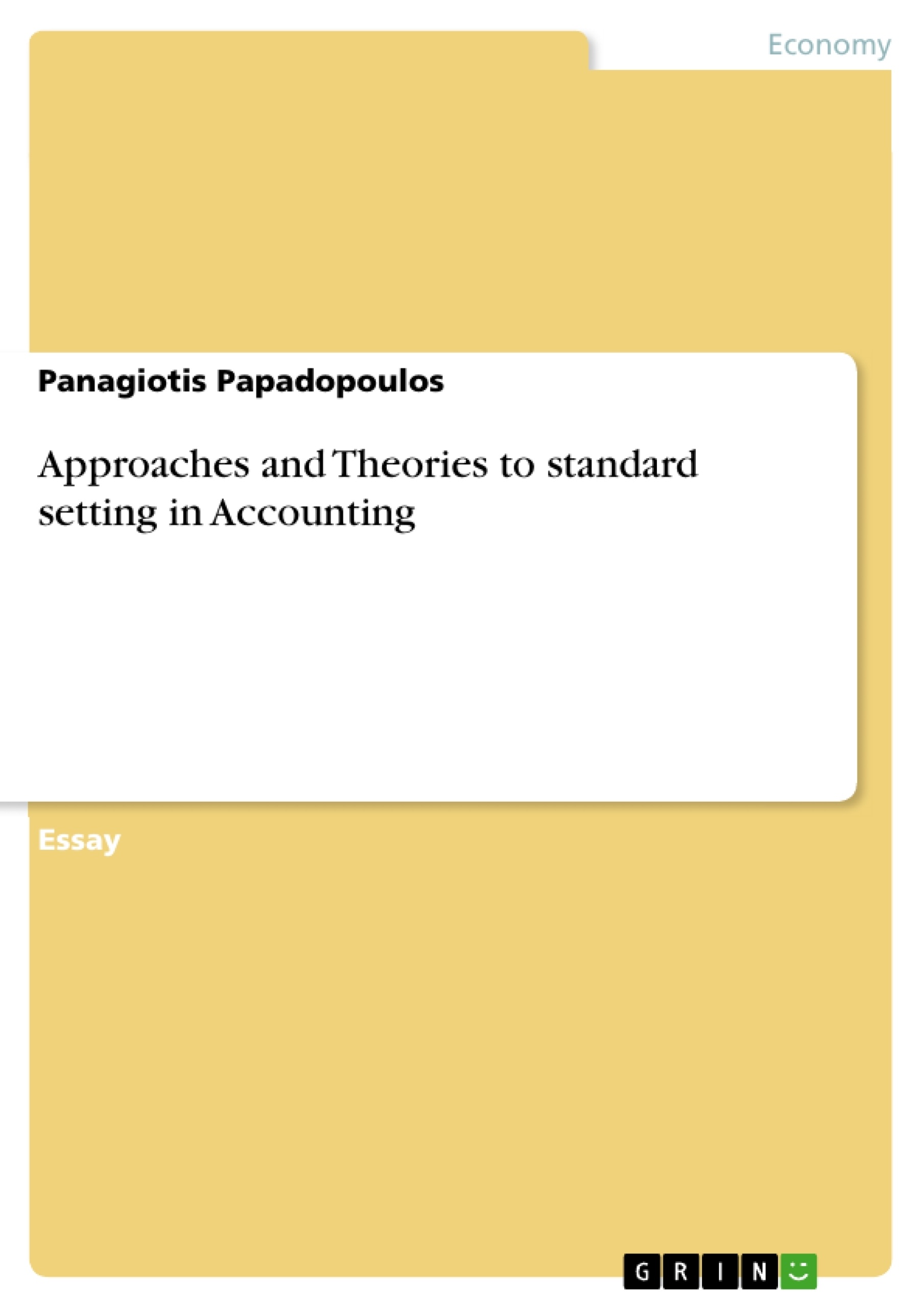Since the financial crisis in 2008 the topic regulation of the markets at all revived. The world was looking for guilty parties in Rating agencies, financial institutions, governments and lastly audit firms and institutions which gave them their working framework – the accounting standards. On the one hand the scream for more regulation in the private sector to protect the public good became louder and on the other hand scientists were warning of such overbearing steps because they would be damaging the economy.
This issue provides the basis for this paper where accounting is seen as an eco-nomic good. Accounting information is not costless to produce for the corporations and it raises compliance costs. On the one hand managers are using accounting rules that minimize information costs and on the other hand shareholders want ac-counting rules that improve their ability to control and monitor the manager’s action.
Theoretically, financial accounting and reporting should be objective, neutral and apolitical. However, the standard setting process can be influenced by external groups with different interests.
Inhaltsverzeichnis (Table of Contents)
- Executive Summary
- Introduction
- Literature Review
- Application & Theory
- Non-Regulation approaches
- Pro-Regulation approaches
- Public Interest Theory
- Capture Theory
- The Political Ruling Elite Theory
- The Economic Theory
- Conclusion
- References
Zielsetzung und Themenschwerpunkte (Objectives and Key Themes)
This paper aims to provide a critical examination of the various approaches and theories related to standard setting in accounting. The focus is on understanding how accounting regulations have evolved, particularly in the context of the 2008 financial crisis. The paper explores the connection between different accounting theories and their application in standard setting practices. Key themes explored in this paper include:- The impact of the 2008 financial crisis on accounting regulation
- The role of regulation in accounting and its implications for market efficiency
- Different approaches to standard setting, including both regulated and non-regulated models
- The interplay between accounting theories and the practical implementation of standard setting processes
- Criticisms and limitations of various approaches to standard setting
Zusammenfassung der Kapitel (Chapter Summaries)
- Introduction: This chapter sets the stage for the discussion by outlining the renewed focus on market regulation in the aftermath of the 2008 financial crisis. It highlights the debate surrounding the need for increased regulation in the private sector to protect public interests, while also acknowledging concerns about the potential negative impact of excessive regulation on the economy. The chapter also introduces the concept of accounting as an economic good, where the production of accounting information incurs costs for corporations and raises compliance concerns.
- Literature Review: This chapter delves into the ongoing debate regarding the necessity of regulation in accounting. It explores the definition of "regulation" and its role in achieving socio-economic policy objectives. The chapter discusses different perspectives on regulation, including the view that a strong market efficiency can negate the need for regulation. The chapter also establishes a connection between approaches to standard setting in accounting and various theories of economic regulation and non-regulation.
- Application & Theory: This chapter examines different approaches to standard setting in accounting, divided into two main categories: non-regulation and pro-regulation. The non-regulation approach, commonly known as the Free Market approach, posits that the market itself should determine the production and regulation of accounting information. Conversely, the pro-regulation approaches advocate for active intervention by government or independent bodies in the standard setting process. This section further explores various pro-regulation sub-approaches, including the Public Interest Theory and the Capture Theory. The Capture Theory examines two specific perspectives: the Political Ruling Elite Theory and the Economic Theory.
Schlüsselwörter (Keywords)
The paper focuses on the key themes of accounting regulation, standard setting, market efficiency, free market approach, pro-regulation approaches, public interest theory, capture theory, political ruling elite theory, economic theory, and the impact of the 2008 financial crisis on accounting practices.Frequently Asked Questions
How did the 2008 financial crisis impact accounting regulation?
The crisis led to a renewed focus on market regulation, with many questioning the role of accounting standards and audit firms in the systemic failure, leading to calls for more robust oversight.
What is the "Public Interest Theory" in accounting?
This theory advocates for regulation based on the idea that it should protect the public good and correct market failures to ensure transparency and fairness.
What is the "Capture Theory"?
Capture Theory suggests that regulatory bodies may eventually be "captured" or controlled by the very industries they are supposed to regulate, serving private rather than public interests.
What is the Free Market approach to accounting standards?
This approach posits that the market itself should determine the production of accounting information through the forces of supply and demand, without government intervention.
Why is accounting information considered an "economic good"?
Because it is not costless to produce; it requires resources for preparation and compliance, and it has value for decision-making by managers and shareholders.
- Quote paper
- MSc Panagiotis Papadopoulos (Author), 2011, Approaches and Theories to standard setting in Accounting, Munich, GRIN Verlag, https://www.grin.com/document/182626



